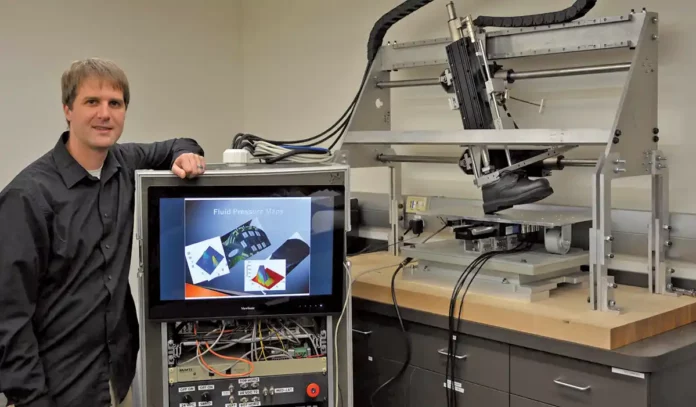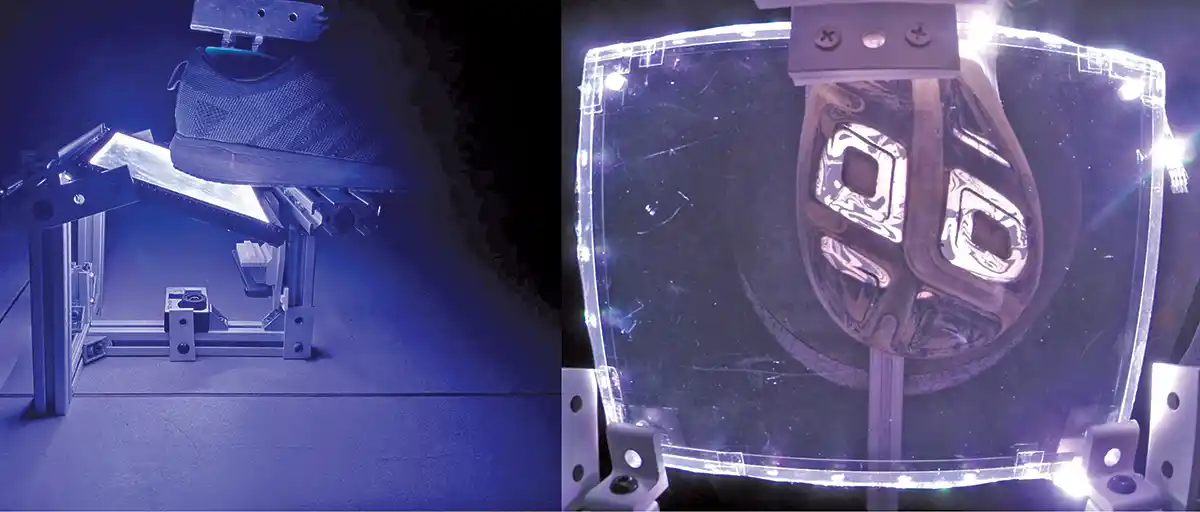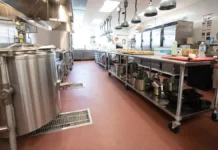
Kurt Beschorner of the University of Pittsburgh is making great strides — literally and figuratively — to prevent slips and falls for food service workers.
“Falls are one of the leading causes of injury for all workplaces, but especially in food service,” said the associate professor of bioengineering, who received his PhD in the same field and has been researching shoe floor friction for over a decade.
With so many slip-resistant shoes on the market, people continue to slip due to poor design and performance. Through their research, Beschorner and his team are determined to help prevent these accidents as much as possible.
Beschorner recently received a 4-year, $2.1 million dollar grant from the National Institute for Occupational Safety & Health to work on his project entitled “Preventing Slips in Food Service: Development of Tools for Shoe Selection and Replacement.”
The field of non-slip footwear is fairly under-researched, so following his existing research, this project was a natural next step to continue it.
Beschorner hopes to fill the gaps even more and to create tools that minimize the risk that exists in every part of a restaurant, from its dining room to its kitchen to its walk-in refrigerator.
As a former food service worker, Beschorner understands the potential for slips and falls in a restaurant setting: the kitchen alone is home to spills, deep fryer oils, and water and detergents near the sink.
His knowledge of the risk factors, along with his experience as a mechanical engineer, has fueled much of his passion for the project. “I wanted to work on jet turbine engines,” he explained. “Then I learned that I could apply my knowledge to keeping people safe, and it sounded like a really interesting and important way of using my skills.”
The project and research, which is being done through the University of Pittsburgh’s bioengineering department, aims to create two tools for restaurants and their employees.
The first will help restaurants and their employees to select proper footwear that is affordable, high-quality, and high performing. The second will let employees know when to replace their worn shoes.
To develop both tools, Beschorner and his team are using a user-centered design approach, meaning that they are involving real restaurant workers at every stage of the project.
“We plan to circle back to them periodically at each stage of development for feedback,” Beschorner explained. “Then, once tools are developed, we’ll work with restaurants to deploy them and measure their efficacy.”
The project will primarily be measuring the performance of different non-slip shoes that are on the market. Beschorner explained that his research isn’t necessarily looking for how, exactly, the shoe achieves its performance, because there are a lot of variables that can affect performance.
Instead, he aims to understand whether or not the shoe performs well in slippery conditions. This information will be communicated to food service workers so that they can make informed decisions that consider the shoe’s friction performance along with their other priorities, allowing them to choose a shoe that they like and that they can trust.

In terms of categorical differences that exist in footwear, the PA based educator explained that the information provided by the project’s tools will be broadly applicable to all people.
Weight and height generally don’t impact slip risk, according to his research, but gender will be acknowledged, and information will be available for both men and women’s shoes.
The research also aims to provide options with quality footwear at different price points.
Not only will the project’s tools benefit food service employees, who are the most at risk in the food service world, but it will also benefit shoe manufacturers, insurance companies, and restaurant owners.
For example, there will be opportunities for shoe manufacturers to collaborate on footwear in the future. Insurance companies, too, are an important audience, Beschorner said, as the tools can help save money on workers’ compensation claims.
Finally, restaurant owners will be able to provide their employees with safe footwear. Whether they decide to subsidize shoes or allow employees to finance the cost, these tools will ensure that smart decisions are made, and effective footwear options and replacement tools are provided.
Beschorner explained that there’s not necessarily a guarantee for slip and falls to end altogether, but there are plenty of opportunities to prevent them as much as possible.
The tools that will come out of the project aim to do just that. “In our lab experiments,” he continued, “We’ve found that over 50% of people will slip in one shoe, while 0% will slip in another. There’s a lot of potential.”
For more information on the project and its timeline, or to collaborate/participate in this research, contact Kurt Beschorner: beschorn@pitt.edu.
























